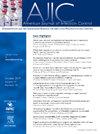公众使用的面戴式源头控制产品向外泄漏总量。
IF 3.8
3区 医学
Q2 INFECTIOUS DISEASES
引用次数: 0
摘要
背景:在 COVID-19 大流行期间,公众使用他们能得到的任何面戴式产品来克服 N95 呼吸器和外科口罩的短缺。这些产品往往不符合任何标准,在减少呼吸道病毒传播方面的效果令人担忧:本研究对公众使用的九类面戴式产品的外漏总量(TOL)进行了量化。研究人员设计了一套台式系统,在两个不同尺寸的硅胶弹性表皮头模上测试每类产品的两个单元。每个头模佩戴五次:结果:面罩产品类别和头模尺寸对 TOL 均有显著影响(P-Value 结论):总体而言,单层布质口罩是最不有效的源头控制措施,因为在测试的面戴式产品中,单层布质口罩的 TOL 最高。三层一次性口罩可能是公众进行源头控制的有利选择。应为面戴式产品的设计和制造制定标准,以适应不同的面部尺寸。本文章由计算机程序翻译,如有差异,请以英文原文为准。
Total outward leakage of face-worn products used by the general public for source control
Background
During Coronavirus disease 2019 pandemic, the general public used any face-worn products they could get to overcome the shortage of N95 respirators and surgical masks. These products, often not meeting any standards, raised concerns about their effectiveness in reducing the spread of respiratory viruses.
Methods
This study quantified total outward leakage (TOL) of units from 9 face-worn product categories used by members of the general public. A benchtop system was devised to test 2 units from each category on 2 different-sized headforms with silicone elastomer skin. Each unit was donned 5 times per headform.
Results
Both face-worn product category and headform size significantly affected TOL ( value < .05). The TOL of tested face-worn products varied from 10% to 58% depending on both model and headform size. Face-worn products donned on the medium headform had a higher mean TOL compared to those donned on the larger headform.
Conclusions
Overall, single-layer cloth masks are the least effective measure for source control due to their highest TOL among the tested face-worn products. Three-layer disposable face masks may be a favorable option for source control among the public. A standard should be developed for face-worn product design and manufacturing to accommodate different facial sizes.
求助全文
通过发布文献求助,成功后即可免费获取论文全文。
去求助
来源期刊
CiteScore
7.40
自引率
4.10%
发文量
479
审稿时长
24 days
期刊介绍:
AJIC covers key topics and issues in infection control and epidemiology. Infection control professionals, including physicians, nurses, and epidemiologists, rely on AJIC for peer-reviewed articles covering clinical topics as well as original research. As the official publication of the Association for Professionals in Infection Control and Epidemiology (APIC)

 求助内容:
求助内容: 应助结果提醒方式:
应助结果提醒方式:


